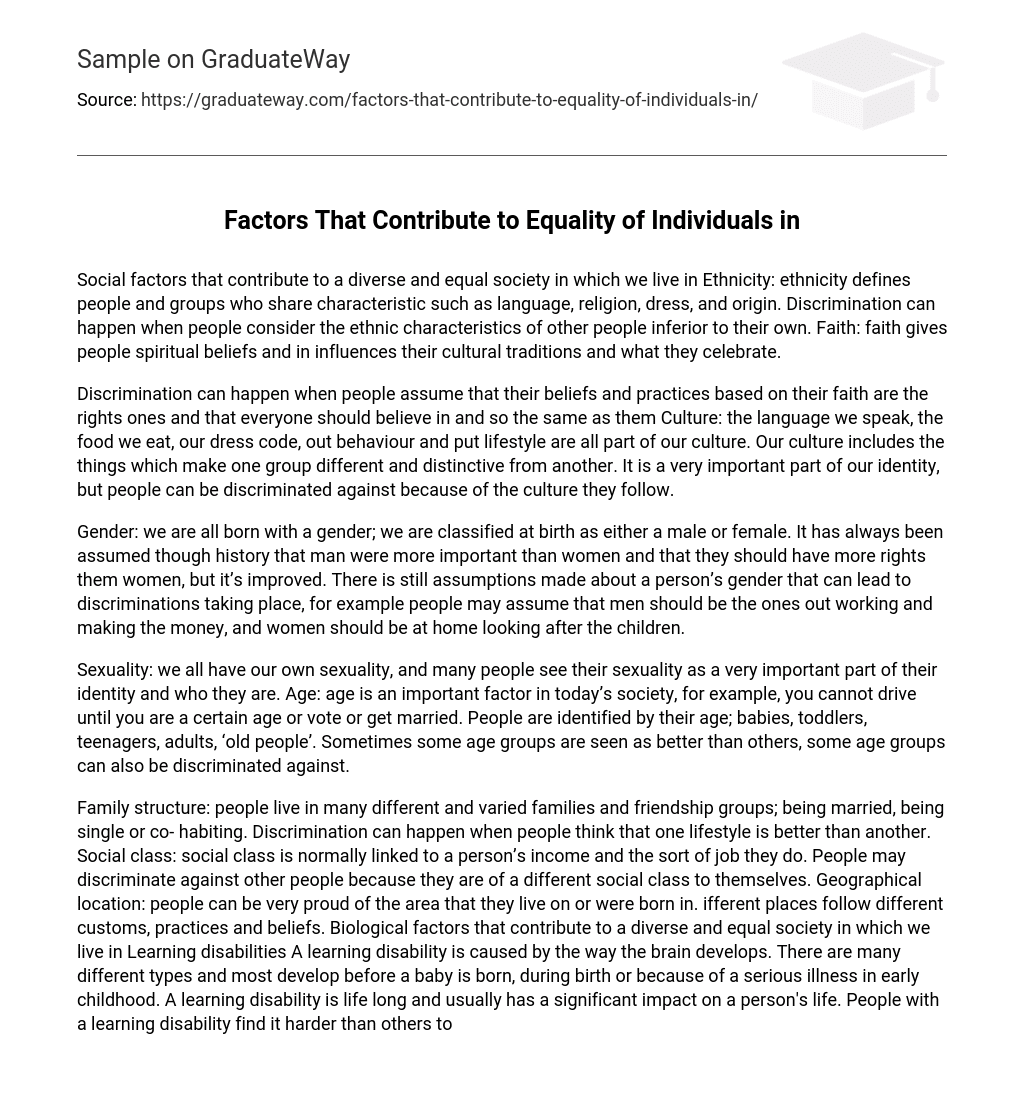Social factors that contribute to a diverse and equal society in which we live in Ethnicity: ethnicity defines people and groups who share characteristic such as language, religion, dress, and origin. Discrimination can happen when people consider the ethnic characteristics of other people inferior to their own. Faith: faith gives people spiritual beliefs and in influences their cultural traditions and what they celebrate.
Discrimination can happen when people assume that their beliefs and practices based on their faith are the rights ones and that everyone should believe in and so the same as them Culture: the language we speak, the food we eat, our dress code, out behaviour and put lifestyle are all part of our culture. Our culture includes the things which make one group different and distinctive from another. It is a very important part of our identity, but people can be discriminated against because of the culture they follow.
Gender: we are all born with a gender; we are classified at birth as either a male or female. It has always been assumed though history that man were more important than women and that they should have more rights them women, but it’s improved. There is still assumptions made about a person’s gender that can lead to discriminations taking place, for example people may assume that men should be the ones out working and making the money, and women should be at home looking after the children.
Sexuality: we all have our own sexuality, and many people see their sexuality as a very important part of their identity and who they are. Age: age is an important factor in today’s society, for example, you cannot drive until you are a certain age or vote or get married. People are identified by their age; babies, toddlers, teenagers, adults, ‘old people’. Sometimes some age groups are seen as better than others, some age groups can also be discriminated against.
Family structure: people live in many different and varied families and friendship groups; being married, being single or co- habiting. Discrimination can happen when people think that one lifestyle is better than another. Social class: social class is normally linked to a person’s income and the sort of job they do. People may discriminate against other people because they are of a different social class to themselves. Geographical location: people can be very proud of the area that they live on or were born in. ifferent places follow different customs, practices and beliefs. Biological factors that contribute to a diverse and equal society in which we live in Learning disabilities A learning disability is caused by the way the brain develops. There are many different types and most develop before a baby is born, during birth or because of a serious illness in early childhood. A learning disability is life long and usually has a significant impact on a person’s life. People with a learning disability find it harder than others to learn, understand and communicate.
People with profound and multiple learning disabilities need full-time help with every aspect of their lives – including eating, drinking, washing, dressing and using the toilet. Physical disabilities A physical disability is impairment which limits the physical function. Some causes of a physical disability are acquired before birth, for example, the mother may have a disease or genetic incompatibilities between the parents, which is then passed on to the child. Another cause is during birth, this could be cause of lack of oxygen that affects the brain.
You can also have disability gained after birth like an accident, infection or other illness. Political factors that contribute to a diverse and equal society in which we live in Legislation: there are many laws in the United Kingdom that help to create a fairer and no-discriminatory society; •The sex discrimination act 1975: this act of parliament has made it compulsory not to discriminate between men and women within the areas of employment, access to goods and facilities.
The act tries to provide equal opportunities for both men and women to gets jobs and also equal promotions within their jobs. •The disability discrimination act 1995: this act of parliament was designed to prevent discrimination taking place because of a person disability. The equal pay act 1970: this act of parliament has made it compulsory that employers do not discriminate between men and women in terms of their pay and working conditions •The race relations act 1979: race is about someone’s skin colour, nationality, ethnic or national origins. This act of parliament has made it unlawful to discriminate because of someone’s race in employment, housing or service. Benefits of diversity; Arts, food, education, tolerance, social cohesion, economic, employment expertise, cultural enrichment, language





